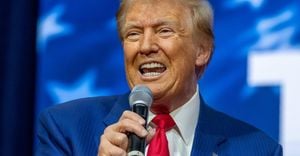With Donald Trump back on the political stage after his recent victory, the dynamics of international relations are once again under scrutiny, especially concerning South Asia. Trump’s re-election could rewrite the narrative for countries like India and Pakistan, as their leaders express both hope and caution about the possible ramifications of his return to the White House.
India’s Prime Minister, Narendra Modi, didn’t wait long to congratulate Trump, referring to him as “my friend.” Modi's message hinted at optimism, with the Indian premier expressing eagerness to renew collaboration and strengthen the comprehensive India-US strategic partnership. This friendly tone is not new; Modi and Trump have showcased their camaraderie on several occasions, most famously at the "Howdy Modi" event in Houston and the "Namaste Trump" gathering in Gujarat, which marked significant moments for India-US relations.
During Trump's first term, relations with India prospered, largely due to shared goals, particularly concerning the containment of China’s influence across Asia. The two nations recognized mutual interests amid growing global tensions, especially with China's rising power and assertiveness. Experts speculate there could be even greater alignment on defense and technology matters moving forward.
Trump’s bilateral engagement strategy may lead him to reinforce existing military partnerships with India. Recently, the US approved defense sales worth $20 billion to New Delhi, enhancing their strategic alliance. Policy analysts suggest Trump may deepen geopolitical engagement with India, particularly through the QUAD—a strategic group involving the US, India, Japan, and Australia aimed at promoting security and stability in the Indo-Pacific region.
Still, the geopolitical atmosphere is anything but predictable. Modi and foreign policy experts have identified potential challenges, particularly surrounding economic interactions. Critics fear Trump's "America First" approach might lead to higher tariffs on Indian exports, which could impact key sectors like IT, pharmaceuticals, and textiles. There’s history to back these apprehensions, as Trump has previously labeled India as “tariff king” and expressed intentions to implement reciprocal tax systems on goods.
Turning to Pakistan, Trump’s re-election could also reshape its troubled relationship with the US. The former Prime Minister, Imran Khan, currently imprisoned, congratulated Trump, pointing to hope for improved US-Pakistan relations. Khan expressed belief Trump might uphold democracy and human rights, bringing benefits to global welfare.
Some analysts posit Khan’s party, Pakistan Tehreek-e-Insaf (PTI), may hope for US diplomatic intervention concerning Khan’s legal troubles. There’s speculation Trump might press for Khan’s release, reminiscent of their warm exchanges during Khan's tenure as Prime Minister. But reality paints a more complex picture. Trump's administration might not prioritize Pakistan during his second term, as they grapple with pressing global issues like tensions with China and persistent conflicts in Ukraine and the Middle East.
Former officials suggest the Trump administration will likely view Pakistan primarily through the lens of counterterrorism, potentially neglecting broader diplomatic or economic engagement. Despite some warm messages post-election, top Pakistani officials are cautious, affirming their non-interference policy with the US. The spokesperson for Pakistan's Ministry of Foreign Affairs emphasized mutual respect as the future guiding principle of US-Pakistan relations.
Political experts are skeptical over how pivotal Pakistan will be to Trump's agenda. During his first term, Trump’s relationship with Islamabad soured, with accusations of "lies and deceit" overshadowing diplomatic interactions. These tensions won’t evaporate easily, especially since Pakistan’s partnership with China presents complications. China has invested heavily through the $62 billion China-Pakistan Economic Corridor, tightening economic ties, even amid concerns about Pakistan’s $130 billion debt, largely accumulated under Chinese loans.
The crux of the matter lies in whether Pakistan can effectively balance its geopolitical stance. Analysts believe there may be conflicting interests if Trump’s hawkish stance against China gains traction, forcing Pakistan to navigate relations delicately. The dual pressure of maintaining close ties with both the US and China could pose significant diplomatic challenges.
Experts predict the Trump administration will remain focused on its immediate challenges, such as addressing regional tensions and global trade dynamics, leaving less attention for Pakistan. Should tension escalate with Iran, some argue Pakistan could be called upon as a partner, but this sentiment is speculative at best.
Back to India, as global supply chains evolve, the importance of Indian participation may well increase. Analysts anticipate Trump may favor contributing to India’s defense capabilities and stimulating business collaborations, potentially exacerbated by concerns surrounding China's role. The need for India to engage effectively with the US, especially as they seek to shift supply chains away from China, can open new avenues for cooperation.
Through Trump’s second term, it is expected trade issues will reach heights of tension as well. Experts urge Indian officials to manage expectations, as Trump's isolationist tendencies may extend consequences for trade dynamics, leaving the Indian government to grapple with ambitious strategies to sustain economic growth against increasing trade barriers.
The broader geopolitical intricacies suggest both opportunities and pitfalls lie ahead for India and Pakistan under Trump’s refreshed leadership. While optimism prevails among some South Asian analysts, skepticism remains around how much priority the region will maintain amid pressing global challenges. The narrative will continue to evolve, and as events unfurl under Trump 2.0, the world watches closely.



